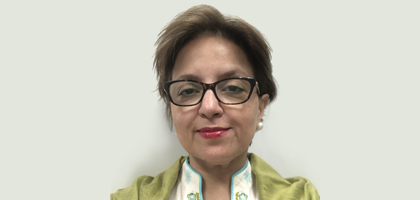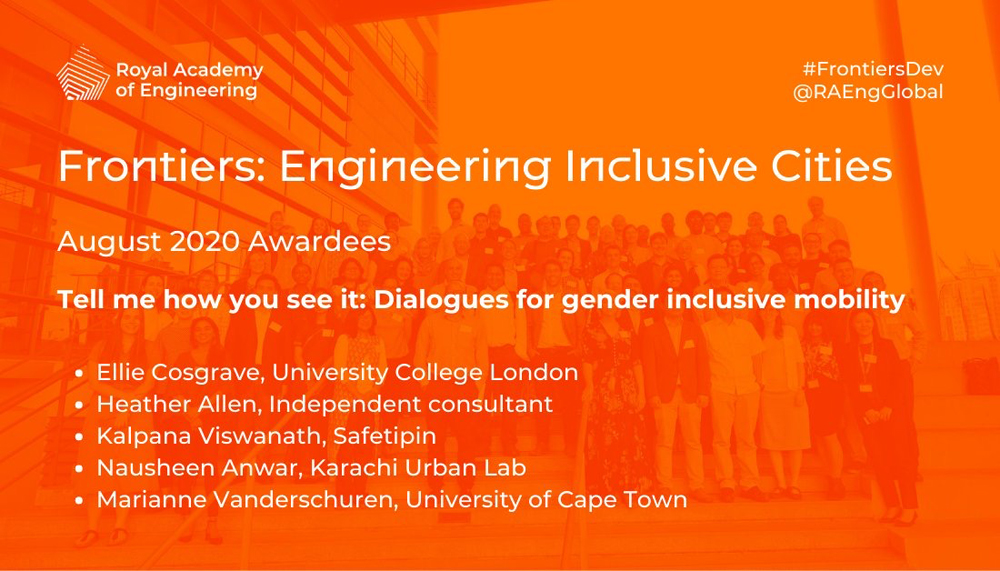Faculty Achievement View More Faculty Achievements

Global Participation
IBA faculty delivers a keynote speech on climate change at the inaugural annual lecture at Aga Khan University, Nairobi
Dr. Nausheen H. Anwar, Professor of City & Regional Planning, School of Economics and Social Sciences, IBA Karachi, and Director, Karachi Urban Lab (KUL), delivered a captivating keynote speech at the Aga Khan University (AKU) in Nairobi, Kenya. The event, titled 'Thermal Injustice and the City: Some Reflections on Living and Surviving the Anthropocene in Nairobi and Karachi,' was organized collaboratively by AKU and the Samuel Hall Foundation. The talk was a part of the broader thematic initiative on ‘Asia and Africa in Conversation: Cities, Migration, and Climate Change.’
Watch valuable insights and reflections on the pressing issues addressed in the keynote speech here:
Published Works
IBA faculty co-authored a working paper exploring the politics of infrastructure development in Asia's hinterlands
Dr. Nausheen H. Anwar, Professor of City & Regional Planning, School of Economics and Social Sciences, IBA Karachi, and Director, Karachi Urban Lab (KUL), co-authored a working paper titled 'Fast-Tracking Pakistan's Grid Modernity- exploring the politics of infrastructure development in asia's hinterlands'. The SSRC workshop InterAsian Connections VI: Hanoi Vietnamese Academy of Social Sciences (VASS), featured the initial presentation of this working paper.
Executive Summary
Pakistan's focus on infrastructure has been renewed because of the various infrastructure projects under the USD $62 billion China-Pakistan Economic Corridor (CPEC), which is part of China's Belt Road Initiative (BRI). The CPEC has become a symbol of a 'rising Pakistan' with expectations of significant economic development. However, protests and frictions arise in spaces where projects are located, and these protests are infused with entrenched caste, class, ethnicity, and gender relations. The Thar Engro Coal Power project-a 660 MW coal-fired power plant and the 1200 MW Quaid-e-Azam Solar Park are two CPEC projects that aim to lead Pakistan to energy self-sufficiency. Both projects have been constructed on a 'fast track' basis to attract investors and are in hinterland regions. These large-scale infrastructure projects facilitate the flows of land and energy and are powerful technologies of statecraft or disciplinary rule that disentangle land and common-property resources from local social relations and reconfigure them as private property. The grid, as an infrastructural object and a space of violence, indexes a relationship to land, ecology, and a politics of (dis)connectivity with struggles for entitlements, rights, and recognition. The grid is a potent site for investigating a politics of power that incorporates the promise of socio-economic progress amid anxieties of social exclusion, ecological degradation, and displacement.
The working paper can be accessed here.
Recognition
IBA faculty joins the collaborative Technical Advisory Board of WHO, WMO and Public Health Agency of Canada
Dr. Nausheen H. Anwar, Professor of City & Regional Planning, at the School of Economics and Social Sciences, IBA Karachi, and Director, Karachi Urban Lab (KUL), recently joined the collaborative Technical Advisory Board of the World Health Organization (WHO), World Meteorological Organization (WMO) and Public Health Agency of Canada.
As part of the Board, Dr. Anwar along with other academic experts and agencies from around the world, will be a part of the project 'Informing decision-making about indoor heat risks to human health' and will synthesize evidence and support decision-making to protect people from overheating in indoor environments.
We congratulate Dr. Nausheen on her new role and wish her success in her future endeavors.
The project details can be accessed here.
Media Engagement
IBA Faculty discusses climate change and its impacts across the planet on Al-Jazeera
Dr. Nausheen H. Anwar, Professor of City & Regional Planning, Department of Social Sciences and Liberal Arts, School of Economics & Social Sciences, IBA, and Director Karachi Urban Lab (KUL), appeared on a panel discussion on 'The Stream: Will extreme weather spur world leaders to act on climate change?' on a global news channel, Al-Jazeera. The panel included, Kendra Pierre-Louis, Senior Climate Reporter, How to Save a Planet, and Dr. Joeri Rogelj, Director of Research, The Grantham Institute, Imperial College London.
The discussion revolved around the record-breaking heatwaves and their adverse consequences around the globe. Dr. Anwar, giving examples of South Asia, provided context on the urban situation and opined, "It's not just about heatwaves, which have a more regional context, but also about urban heat island effects. So, cities like Karachi where I am based currently have gotten warmer over the last 60, 70 years and being prepared means that are you rolling out the kinds of heat alert plans, health infrastructure planning, urban planning and energy efficiency plans that target vulnerable communities."
Watch the full interview here
Published Works
IBA faculty co-authors a report examining the effects of COVID-19 and heat on the urban poor in Asia and Africa
Dr. Nausheen H. Anwar, Professor of City & Regional Planning, Department of Social Sciences and Liberal Arts, School of Economics & Social Sciences, IBA, and Director Karachi Urban Lab (KUL), and the Karachi Urban Lab collaborated with partners across Southern cities for a study on 'Extreme Heat & Covid-19: The Impact on Urban Poor in Asia & Africa'. The study provides substantial new data on the direct as well as indirect impacts of the COVID-19 pandemic, thermal comfort, and heat-related illness, in Jakarta (Indonesia), Hyderabad (India), Karachi and Hyderabad (Pakistan) and Douala (Cameroon). Alongside data on heat exposure and symptoms associated with heat-related illness, the report supplies supplementary data such as points on access to electricity, water, food, health services, as well as income and food intake during the COVID-19 pandemic, which will be of use to policy makers and researchers.
The report can be accessed here
Recognition
Dr. Nausheen H. Anwar publishes an article on climate change in UNDP's Development Advocate Pakistan magazine
Dr. Nausheen H. Anwar, Professor City & Regional Planning, Department of Social Sciences and Liberal Arts, School of Economics and Social Sciences and Director Karachi Urban Lab, has recently penned an article titled, 'Equality Matters'. The piece is published in the latest edition of UNDP's Development Advocate Pakistan magazine.
The study explores the relationship between gender equality and climate change.
Recognition
IBA Faculty co-leads a UK-based project on mobility infrastructure design
Dr. Nausheen H. Anwar will be leading from Pakistan a new project titled, 'Tell me how you see it: Dialogues for gender inclusive mobility', supported by the United Kingdom's Royal Academy of Engineering, in collaboration with colleagues who work on gender, sustainable transport, urban planning, and climate change in India, South Africa, United Kingdom, and USA. Women's mobility is deeply affected by the design of public space they travel in both developed and developing countries. The goal of this project is to develop a workbook and checklist to support those designing mobility infrastructure to include a gender perspective.

Recognition
Recipient of the Global Challenges Research Fund
Nausheen Anwar, Professor City & Regional Planning and Director Karachi Urban Lab, in the IBA SSLA Department, has won a new grant of £281,000, for her project "Cool Infrastructures: Life with Heat in the Off-Grid City", funded by the United Kingdom's Economic and Social Research Council (ESRC) through the Global Challenges Research Fund (GCRF), a £1.5 billion UK Government scheme to support cutting edge research and global impact towards the Sustainable Development Goal.
Background:
The UN's 'Cooling for All' coalition estimates that 1.1 billion people worldwide have little or no access to cooling to protect them against extreme heat. Those most at risk include approximately 630 million people across South Asia, South East Asia and Sub-Saharan Africa who reside in poor quality housing on low incomes, with limited, intermittent or insecure access to electricity and few, if any, electrical cooling appliances.
About the project:
The research project is the first comparative attempt to understand how marginalized urban residents meet their needs for cool food, water and space when temperatures in their cities rise. The project will generate new insights into the energy cultures, practices, and vulnerabilities of the urban poor and generate new evidence for urban heat action plans. The project's team of researchers will work with city authorities and marginalized communities in Hyderabad, Karachi, Jakarta and Yaoundé.
This grant is part of a larger £1.8 Million project consortium and is led by the University of Edinburgh in collaboration with the Indian Institute of Technology – Hyderabad and the Hyderabad Urban Lab, India; the Karachi Urban Lab and Institute of Business Administration, Pakistan; the Bandung Institute of Technology, Indonesia; Nanyang Technological University, Singapore; the Fondation Paul Ango Ela, Cameroon; and Ludwig Maximilians University Munich, Germany.
This project also provides a unique opportunity for a multidisciplinary team (anthropologists, urban planners, engineers, science & technology experts, architects) to come together to investigate a defining political issue for marginalized urban communities in cities across the world.
For more information about Professor Nausheen and her colleagues' initial explorations into the relationship between heat and Covid-19, read the first published output of this project: http://somatosphere.net/2020/heat-covid-off-grid.html/
